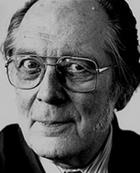
Reference of the Estonian letters and several times candidate for the Nobel, the life of Jaan Kross is marked almost from the first moment by the political events of his country. Born in Tallin on February 19, 1920, seventeen days after the Treaty of Tartu ended the War of Independence of Estonia and forced the USSR to recognize the sovereignty of the country. He spent his childhood and adolescence in Kalamaja, a port district of the city, and studied at the Jakob Westholm school, center that would inspire the famous Wikman Academy of his novel The Boys of Wikman (1988). In 1938 he left the capital to study law at the University of Tartu. These are convulsive years for the country, and Kross is completely affected: in 1939 Estonia joined the USSR and became a Soviet socialist republic in 1940. Between 1941 and 1944 the country was occupied by Germany; that is when the first arrest of Kross occurs, accused of "nationalist activities" by the Nazi authorities in 1944. In 1946, after the Soviet reconquest of the country, will be arrested again, this time by the KGB, and sentenced to five years of forced labor and five of exile in Siberia. Although he does not fully comply with his sentence, he remains in labor camps in Russia for eight years, where he performs the most diverse tasks (which he will later "assign" to his characters) and begins to exercise his trade as a writer. It is on his return to Estonia, in 1954, when he professionalizes his literary activity. In 1958 he published his first book of poems, Söerikastaja, written in part while he was a prisoner. He will begin to write prose later, in the second half of the 1960s. In his most celebrated and translated novel, The Madman of the Tsar (1978), the protagonist is declared mad for criticizing the Tsarist regime, a fate similar to that suffered in his time by the dissidents of the Soviet system. Also The departure of Professor Martens (1984) establishes a parallel between the political forms of the eighteenth century and the immediate present of the author. In addition to Los chicos de Wikman and its sequel El anillo de Mesmer (1995), the collection of short stories La conspiración y otros historias (1988) and the novels Vuelo estático (1998) or Tahtamaa (2001) stand out. Jaan Kross dies in Tallinn in 2007.






